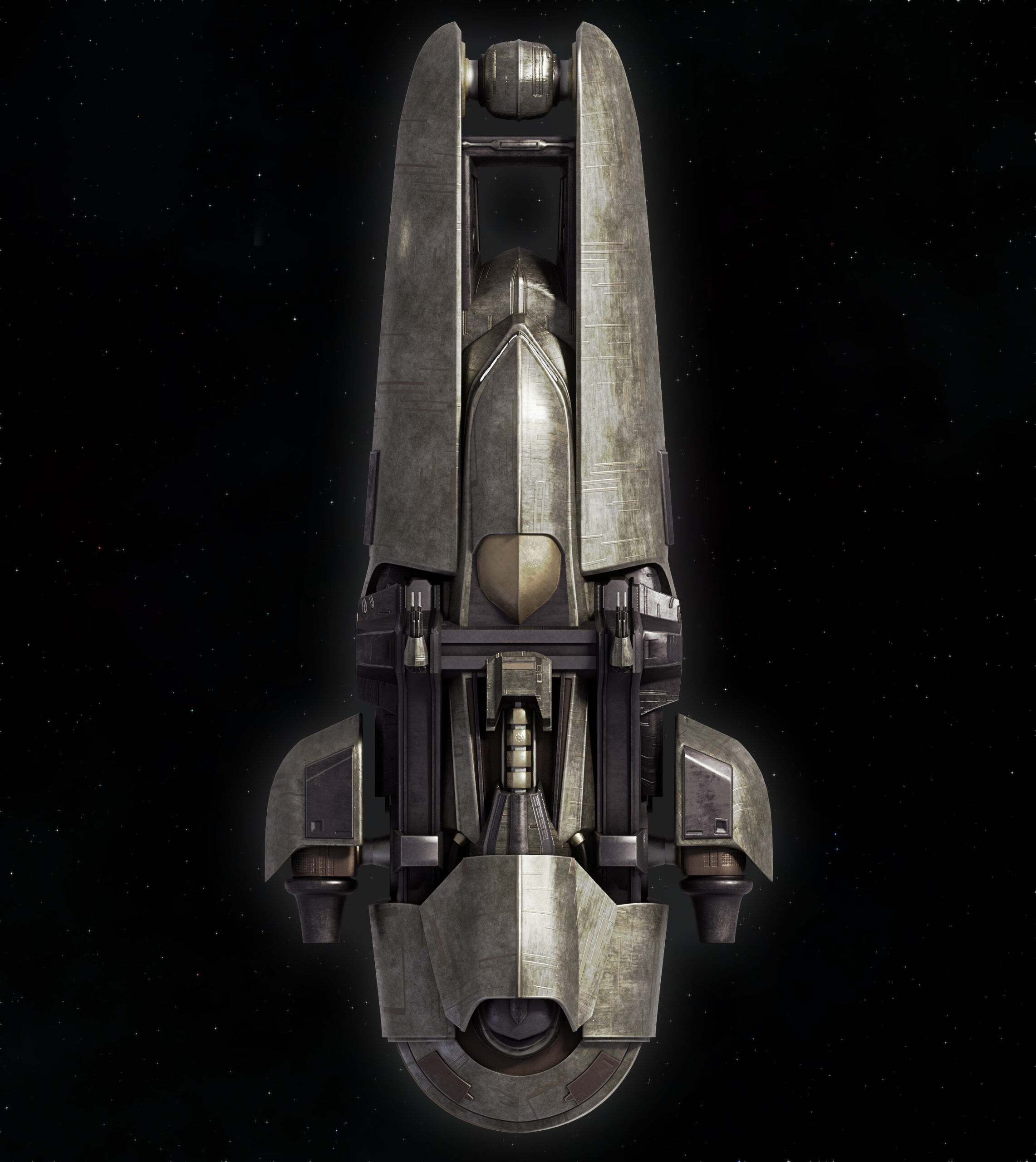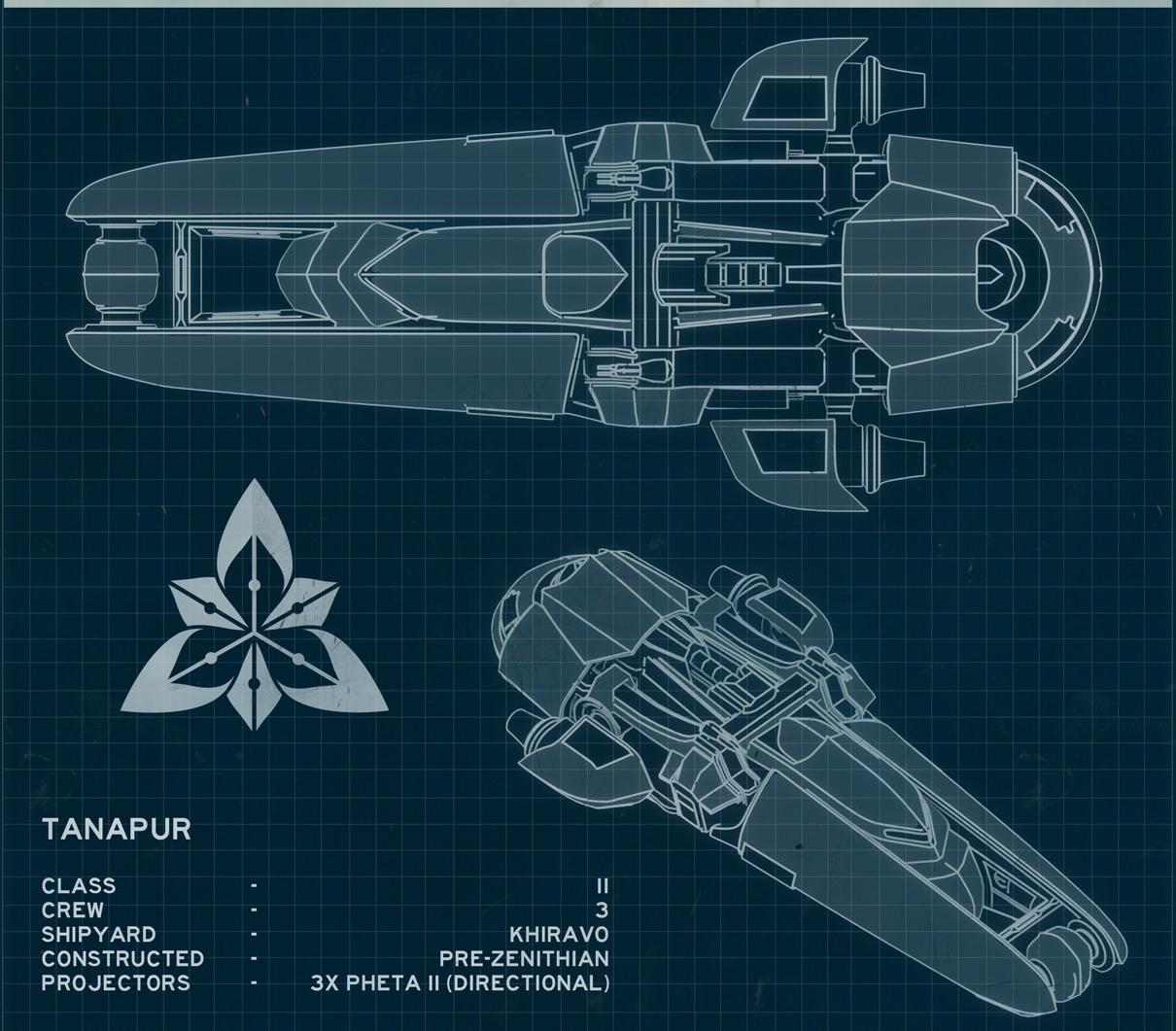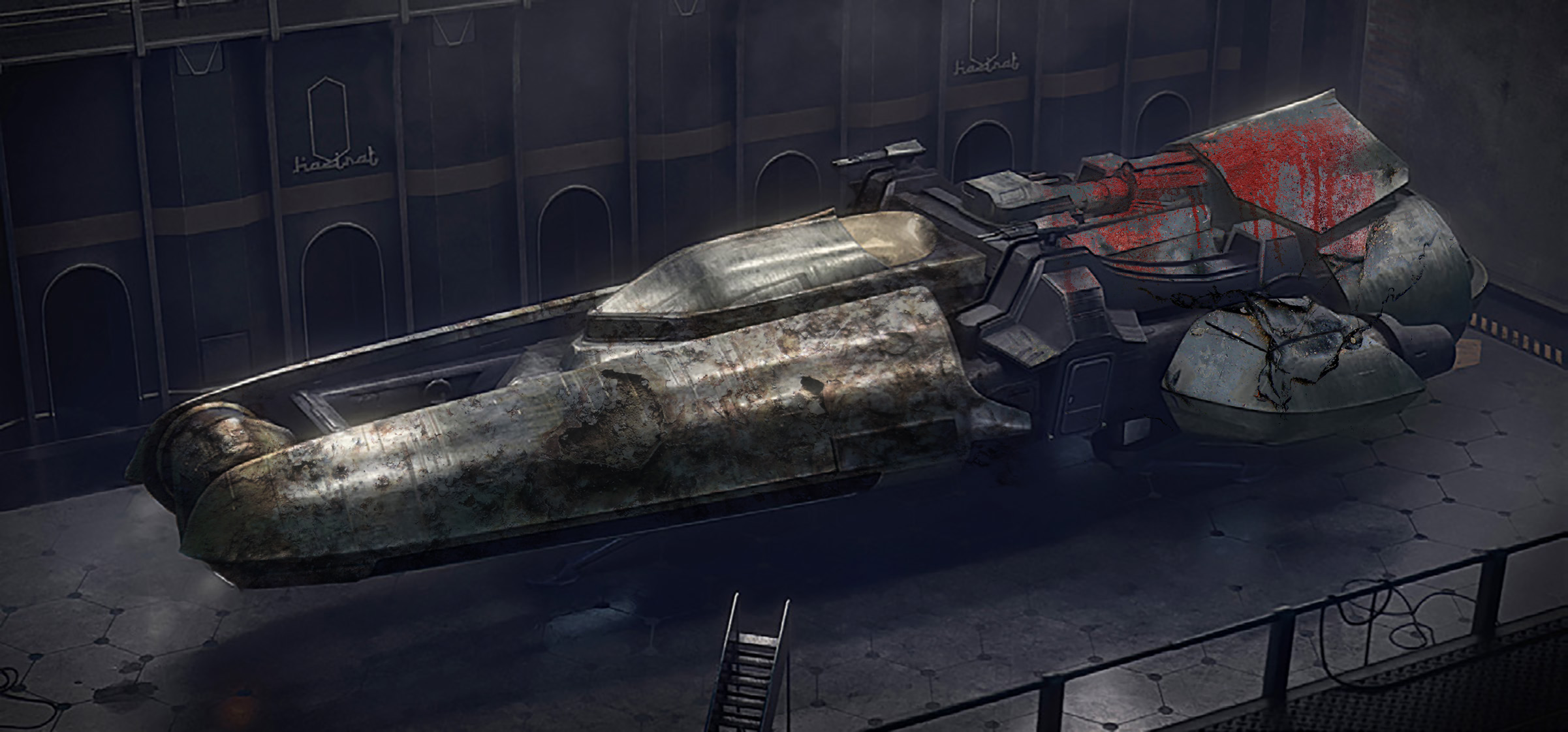
Möngön Sum
According to the Bulletin series Journeys in Deep Night the first time a Tanapur docked at Coriolis station was in CC 29. It registered as a courier ship and supposedly had a Zalosian crew onboard, which led many to assume it was a Karrmerruk shuttle of some kind. Time passed and Zenithian ambitions continued to awaken the slumbering Horizon. As old trade routes reopened, more of these sleek, old ships began to emerge from the darkness of space. Some were nomads, others were agents of remote col-onies, or pilgrims undertaking long journeys across the Horizon. No two crews were the same, or from Zalos for that matter.
As some of these ships fell into the hands of a new generation of travellers, clues about the history of the Tanapur started to crop up, indicating that they had been around for a long time. Discreet markings eventually identified them as originating from the lost shipyards of Khiravo. Since then, this discovery has only raised more questions, as the location of the Khiravo shipyard still remains a mystery to this day.

Khiravo shipyard
The notion of a Firstcome colony big enough to con-struct its own space ships, yet small enough to vanish in The Long Night and fade from the memory of the major Firstcome factions has unsurprisingly stirred up some interest among researchers and historians. A Foundation-sponsored study of the ornamentations and markings of a decommissioned Tanapur corvette carried out in CC 54 concluded that there are some similarities to artifacts found in the remote Dziban system. The archeologist Nisrine Fasaal, who partook in this study, is said to have embarked on an expedition to confirm this theory, but no further evi-dence has been uncovered as of yet.


The Fore
The front section of the ship is more dimly lit than the rest, and consists of four rooms. The bridge and the central room that leads to it are both raised slightly above the main floor giving the crew a wider field of view from their stations. On either side of this raised section is the stasis chambers which in turn sits lower than the main floor, with short stairs leading down to them and a low curved ceiling that is somewhat reminiscent of a cellar. The stasis pods themselves look old and a little clunky compared to newer models.
The Middle
The airlocks on either side lead straight into the main area of the ship, a space that has to serve many functions. Surrounding the small cargo hold are the basic coffins with their little hygiene units, and toward the fore a small common space that is also the ship’s kitchen and cantine. The cargo hold itself is deeply embedded in the structure of the ship and feel almost like a vault. In some cases it has been converted to a holding cell for crews working as bounty hunters or similar activities.
The Stern
In the back end of the ship is a large hemispher-ical chamber that contains the ship’s rather imposing fusion reactor. With a brave engineer at the controls, it can generate generous amounts of energy in relation to the overall size of the Tanapur

Tanapur Corvette
Pre-Zenethian Class II Armored Courier
Although the Tanapur is probably the most commonly seen of the ships that
have been traced back to the lost shipyard of Khiravo, there is nothing common
about it.
What sets the Tanapur corvette apart from most other ships of similar size is its long range capabilities and the rumours of its legendary survivability.
While it is not unheard of for small ships to have stasis pods on board and thus the ability to travel between systems on their own, that is not the standard. It is a feature that has made the Tanapur very appealing to those who wish to go far, fast, and still keep a low profile. Furthermore, Khiravo ships seem to be built anticipating all kinds of external threats, with thick shield-like structures enclosing much of the hull. This characteristic most likely aligns pretty well with the needs of that same type of crew, and may also have been a factor in the longevity of these ships overall.
The downside of the extra protection is the increase in mass which in turn impacts the maneuverability of the craft. However, this is not nearly as severe as one might expect; the fine tuned coordination between the three directional graviton projectors has proven to carry the extra weight very effectively under most conditions. The two primary ones in the rear can rotate 360 degrees independently of each other, while the auxiliary projector in the front, which is limited to a 200 degree rotation, serves to alance the craft during landing and takeoff. This config-uration also has the added benefit of quick decceleration using all three projectors at once, or for making other dra-matic maneuvers.
The offensive capabilities of the Tanapur varies. While the top-mounted twin autocannons are present on most specimens as a self-defense measure, the most common addition beyond that is a torpedo bay incorporated in the front pylons, transforming this quick and ironclad little ship into something rather menacing.
Interior
Whatever time and place gave birth to the Tanapur, it was not one where comfort was highly valued. Its creators did little to compensate for the harshness of space travel. There is nothing wrong with the climate systems onboard, they do as good a job as any of keeping the air warm and pleasant, but that doesn’t change the fact that everything about the interior is hard and cold.
Almost every surface is metallic, some parts painted in sober green and bluish shades of grey, others left untreated, polished by wear and tear. The ambient lighting is soft but cold, contrasted by red warning lights that seem to always turn on for some reason or another. With the crew seats being the exception, there probably isn’t a soft or padded part of the ship that isn’t a later modification of some sort.
There is, in spite of all this, a certain elegance to the interior, with its arched doorways and cambered ceilings. In fact, some details such as the markings that are etched into some of the glossy surfaces are perhaps more dec-orative than they are functional, partly because it isn’t always clear what they mean.
A lot of necessities have to fit in a fairly small space to make possible the long journeys this ship was clearly designed for. As a result, there isn’t much room or privacy onboard. There isn’t even a chapel, unless some area has been converted for that purpose, but most often you’ll find at least some kind of smaller shrine squeezed in somewhere.
Specifications
SHIPYARD: Khiravo, Dziban system (rumoured).
TIME OF CONSTRUCTION: Unknown (pre-Zenithian).
CREW: 3, with 1 extra coffin.
STASIS PODS: 4, with personal storage lockers.
DIMENSIONS: Length 30 m, Width 13,5 m, Height 6 m (9 m with land-ing gears fully extended).
Class CLASS II PRE–ZENITHIAN ARMORED COURIER
Nickname Deep thruster
Motto We break for asteroids
Manufacturer Khiravo Shipyard
Owner Shamus loaded
Beam 15
Length 30,5
Height 9
Speed 4
Cargo & Passenger Capacity 4
ENERGY POINTYS: 4
HULL POINTS: 4
MANEUVERABILITY: 0
SIGNATURE: -1
ARMOR: 5
SPEED: 4
FEATURES: Precise (direcational) thrusters, Atmospheric entry, Reactor burst
MODULES: Docking stations, Cabins (4 coffins), Cargo Hold, Stasis Hold, Weapon System (Twin Autocan-nons).
PROBLEM: Obvious signature
COST: 348 000 Birr
